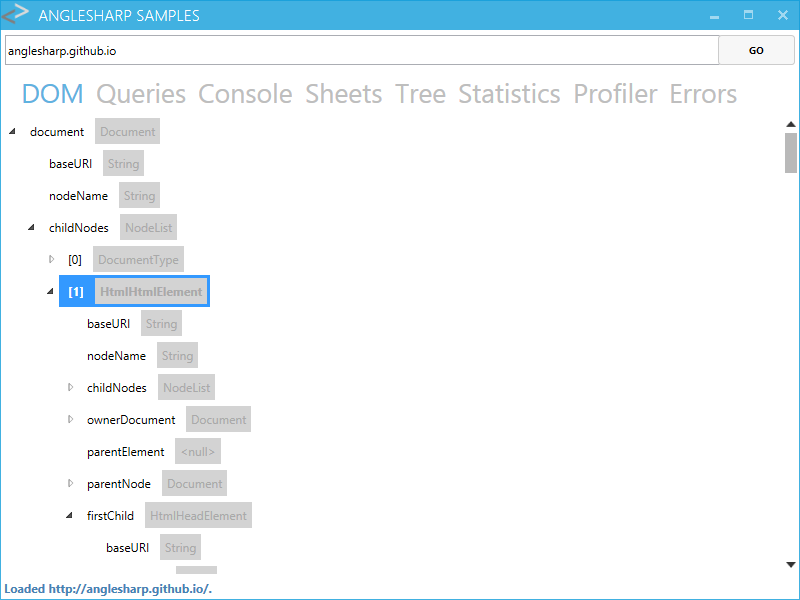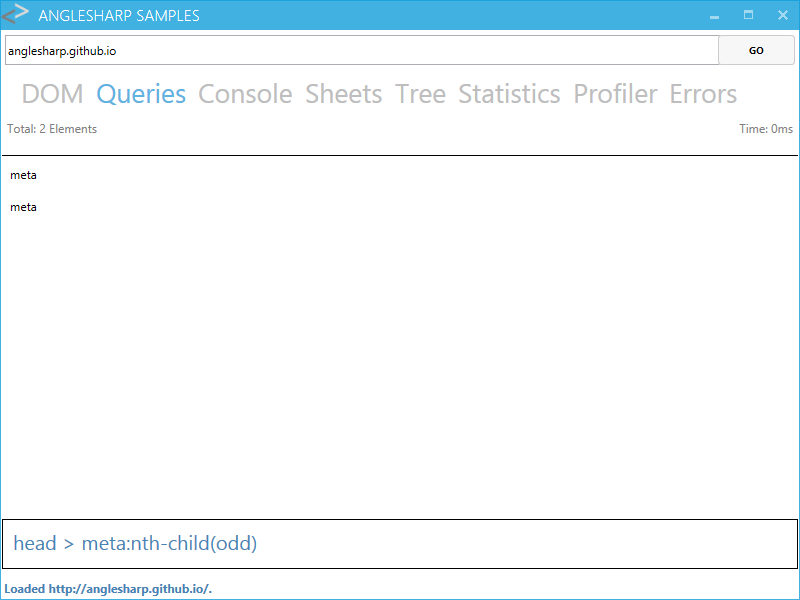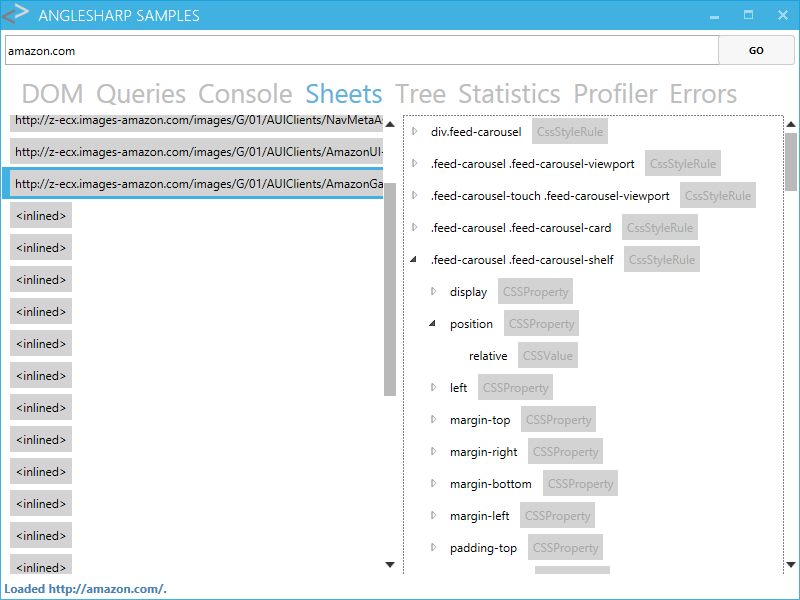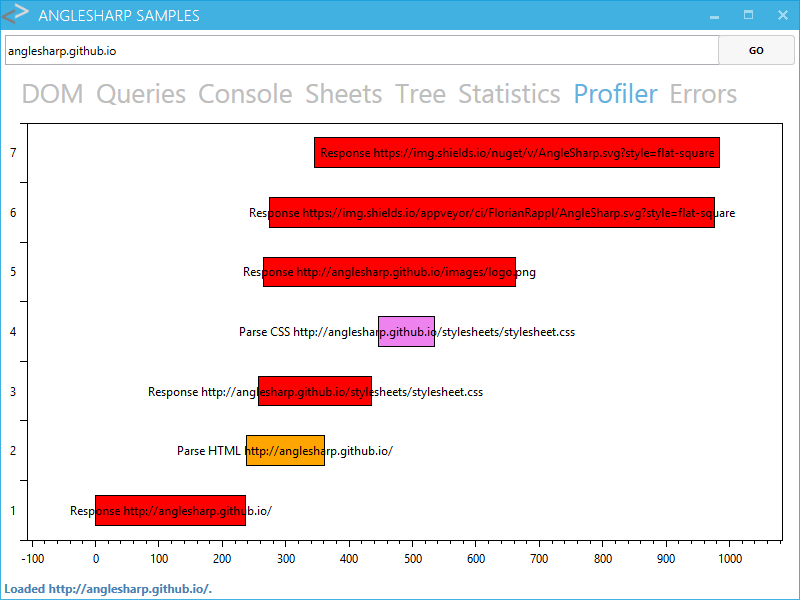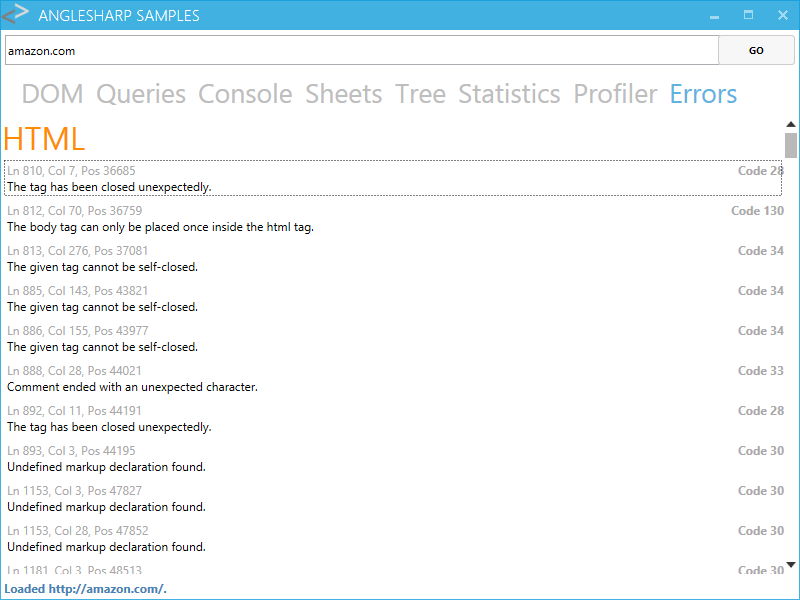A set of sample codes for using AngleSharp.
This is the Visual Studio project for a simple DOM driven browser. It does not have a renderer, but it provides the user with a lot of information that is exposed by AngleSharp. It also integrates AngleSharp.Scripting to provide a little bit of a pseudo JavaScript console.
The application depends on the mahapps.metro package. The ViewModels that also implement the ITabViewModel will be updated once the Document property changes. Each ViewModel is therefore a live example on its own. Some other ViewModels only present information that is aggregated from subscribing to events published via the IEventAggregator. These ViewModels implement the IEventViewModel interface, which lets them being resetted prior to a new request.
The DOM view represents the basic DOM methods and properties in a view similar to the one provided by the debugging tools in modern browsers. Therefore it also reflects all properties, methods and indexers with their respective JavaScript name. This implies reading the INode, finding the DomNameAttribute values on the class and its methods.
The sample is great for learning how to use the published DOM API. It can be easily adjusted to output the original .NET method names instead of the adjusted ones, which match the official naming as specified by the W3C.
One of the best things about AngleSharp is the integrated support for queries via QuerySelector and QuerySelectorAll. This sample provides the user with a textbox that allows input of arbitrary queries. The query is executed and the result is then displayed. Due to WPFs overhead the displaying takes usually a lot longer than the query itself. The time for the query is also portrayed in the upper right corner.
Invalid queries result in a DomException, as we would see it in a browser. The sample catches these exceptions and sets the background of the input box to a red to indicate the failure.
This is a very simple example of using the AngleSharp.Scripting.JavaScript library. It uses Jint to create JavaScript bindings to the published API. Please note that the sample app does not use JavaScript actively. JavaScript is only active in this console view. Hence no JavaScript is loaded or executed on the page.
The code uses a 3rd party WPF control called Terminal. This control is a little bit buggy and sometimes may refuse to alter input. If you have a better suggestion or know the problem, then please contribute.
AngleSharp does not only offer utilities for parsing HTML, but also for inspecting CSS. This sample exposes the stylesheets that are found in currently active document.
Once a stylesheet is selected the contents are displayed in a tree like view. The sample is great for seeing AngleSharp's CSSOM in action.
Of course we can also represent the document as a tree of nodes, including elements, text, comments and the doctype.
This example makes also use of the expoxed HtmlMarkupFormatter, which is the default IMarkupFormatter for HTML code.
This sample uses some techniques to extract a few interesting numbers from the loaded document. We could be interested in the number and the frequency of used CSS class names. Also id names, the distribution of used elements and much more could be of interest.
We use the library Oxyplot to plot the pie charts. If you know other interesting statistics then let us know. We'll always look for contributions here.
Every browser comes with a profiler to detect potential network bottlenecks. The profiler in the samples gives us an easy way to see the performance of a webpage and AngleSharp.
The profiler is implemented by subscribing to the IEventAggregator with events that carry, e.g., the HtmlParseStartEvent to detect the beginning of parsing HTML. These start events do not have a corresponding end event. This is by design and should simplify making connections between start and end events. Since the end event is dependent on the start event, we have to listen for it specifically by adding an event listener to the Ended event on the arguments given by the start event.
Similarly to the profiler we can use the IEventAggregator to read out the errors. We combine all CSS errors into one log. The HTML errors are in a separated log.
Errors noted in the parsing of HTML and CSS documents may indicate invalid markup. They can, however, also indicate a more modern version or a version tailered to a specific user-agent. For instance in stylesheets we will regularly see errors that declaration names are unknown. Such names may be just a regular (known) declaration with a prefix, to support a specific browser. Hence these errors are usually no problem for displaying the page.
A collection of samples that is distributed via the website. Most samples are actually shown in the wiki. Samples may go in any direction (DOM manipulation, scripting, querying elements, events, ...).
These demos can be run via the command line. The executable supports some command line parameters, such as --pause (or -p) to pause between the different samples or --clear (shortform -c) to reset the console buffer after each sample.
Since AngleSharp is built around async and console applications are usually very synchronous by nature, the demos are actually run all run in a fashion to block the execution thread. This way the samples can also be invoked incrementally without any problems.
This sample shows how we can use AngleSharp to construct and populate a valid HTML document according to our needs. In the end we serialize the DOM tree to a string representation.
Very extensive sample that takes an arbitrary input page and tries to create a table of contents form the headers in the document. This sample has been made for articles published on the CodeProject, but it can be very easily customized for any other requirements.
Here we use the JavaScript bindings of AngleSharp.Scripting.JavaScript to showcase how custom DOM events are dispatched. We will receive the custom event with an event handler attached via JavaScript and C#. The whole sample would of course also work without JavaScript, but it is always nice to show two things in a single example.
AngleSharp has been build following the HTML 5.1 specification. This also embodies the rich HTML 5 error handling. A lot of constructs are totally fine and legalized by the HTML 5 parser. The example shows the Google error page, which is totally valid HTML (5) and can be parsed perfectly correct with AngleSharp.
Another example that makes use of AngleSharp's JavaScript bindings. Jint allows JavaScript codes to use patterns such as the IIFE (immediately invoked function expression), which prevents pollution of the global scope. The presented script removes itself from the DOM and also changes other parts of the document.
This is something like a simple "Hello World" for AngleSharp. The sample parses a very simple HTML string and outputs the document. It then adds another element to the document and outputs the (now modified) document again.
We can also use AngleSharp to bring the HTML DOM to XML documents. AngleSharp is not excellent at XML (no validation, no DTD), but it is good enough to build a completely valid tree, which can be queried and manipulated just like normal HTML.
The HTML5 Test sample is currently not included in the suite. It will be included at a later stage, when the JavaScript bindings are good enough to deal with the JavaScript code, which can be found at the HTML5Test.com webpage. It will be interesting to see how many points AngleSharp can score (even without drawing and multimedia capabilities, which make most of the points).
The legacy event scripting sample shows that AngleSharp's JavaScript bindings also allow setting the event handler in a classic way, i.e. without using addEventListener.
The most trivial example to show the scripting bindings in AngleSharp. We change the title of the document and add another span by using the infamous write method of the document. The world would be a better place without this method, however, AngleSharp needs to support it.
What can we learn from a single element retrieved via QuerySelector? Actually a lot. The sample just emphasizes on a few aspects. Mainly special C# methods such as ToHtml, Text and DOM properties such as InnerHtml, OuterHtml and TextContent.
AngleSharp is very LINQ friendly. Every collection implements at least an IEnumerable<T> interface. We can use this to improve the DOM query with C# statements.
The MIT License (MIT)
Copyright (c) 2015 - 2016 AngleSharp
Permission is hereby granted, free of charge, to any person obtaining a copy of this software and associated documentation files (the "Software"), to deal in the Software without restriction, including without limitation the rights to use, copy, modify, merge, publish, distribute, sublicense, and/or sell copies of the Software, and to permit persons to whom the Software is furnished to do so, subject to the following conditions:
The above copyright notice and this permission notice shall be included in all copies or substantial portions of the Software.
THE SOFTWARE IS PROVIDED "AS IS", WITHOUT WARRANTY OF ANY KIND, EXPRESS OR IMPLIED, INCLUDING BUT NOT LIMITED TO THE WARRANTIES OF MERCHANTABILITY, FITNESS FOR A PARTICULAR PURPOSE AND NONINFRINGEMENT. IN NO EVENT SHALL THE AUTHORS OR COPYRIGHT HOLDERS BE LIABLE FOR ANY CLAIM, DAMAGES OR OTHER LIABILITY, WHETHER IN AN ACTION OF CONTRACT, TORT OR OTHERWISE, ARISING FROM, OUT OF OR IN CONNECTION WITH THE SOFTWARE OR THE USE OR OTHER DEALINGS IN THE SOFTWARE.
